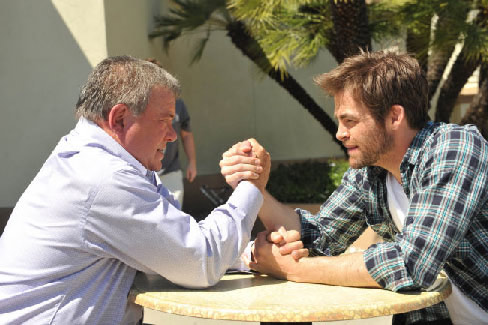Shatner makes a movie only real Trekkies could love

By Becca Hoekstra
The Guardsman
Set your phasers to nerdgasm. William Shatner has written, directed and produced a documentary called “The Captains,” where he interviews the actors who commanded starships in the “Star Trek” franchise. (Did I say franchise? I meant saga.)
“The Captains” premiered at the end of July at Comic-Con and on EpixHD, a subscription movie streaming service. It currently holds the number one spot on EpixHD.com’s top 12 (really… 12). You can sign up for a free two-week trial to check it out.
With Shatner cheesiness… and … typical stylized … voice-over, he attempts to discover what the Star Trek experience meant to the fans, the other actors and to himself.
The whole project seems self-indulgent, with Shatner spending more time talking about himself than any other actor – but, well, it is his movie.
Despite that, the film is sure to be a hit with Trekkies of every enthusiasm level, with each actor’s face that appears on-screen likely to draw a high-pitched fangirlish scream of recognition.
Shatner interviews all the captains who followed him, from Sir Patrick Stewart of “The Next Generation” to Chris Pine from the successful 2009 movie reboot, speckled with appearances from actors such as Jonathan Frakes (“Star Trek: TNG”) and Christopher Plummer (“Star Trek VI”). Kate Mulgrew (“Voyager”) articulates about playing the only female captain, Scott Bakula (“Enterprise”) offers analysis and thoughts on family and Chris Pine shows up for arm wrestling.
The direction and editing aren’t great: captains are introduced step-by-step down the chronological ranks, but then the film loses most of its cohesiveness. Scattered interviews are peppered with clips from the TV series and movies and the Las Vegas Star Trek Convention. Many of the interviews fail to portray valuable core content, with Shatner opting instead for more side babble and superfluous conversation. The tacky elevator jazz soundtrack doesn’t fit at all, sounding more like Brooks’ thought pattern than anything else.
Then there’s the dragging scenes of self discovery, as Shatner milks it by monologuing on a bridge overlooking a river in slow motion. With ducks. Apparently it wasn’t until this film that he came to appreciate the impact of “Star Trek” in his life – though how he missed out on that before is anyone’s guess.
Some of the film’s lowest moments come from Avery Brooks (“Deep Space 9”) falling apart – even Shatner said was “out there” – quite the contrast to the no-nonsense captain he portrayed. He mumbles incoherently while responding to questions with jazz riffs on a piano, as if he’s on some kind of hallucinogenic flashback.
The most rewarding interviews are Stewart’s, with the classy, cultured actor providing real emotional depth and insight surrounding his career. His casting itself is apparently an act of Trek miracles, as neither he nor creator Gene Roddenberry really wanted him on the show.
Even with his esteemed Shakespearean work, he says with a huge, sweet smile that he is “absolutely fine” being most well known for his work on “TNG” (cue nerdy butterflies).
The similarities between captains is striking. They all have theater backgrounds, and many had disastrous family situations resulting from the 16-hour (or more) workdays required for the show. Shatner, Stewart and Bakula all divorced as a consequence. Most importantly, all expressed gratitude, pride and honor at being given a chance to play the role of captain.
All Trekkers and Trekkies should definitely give this one a watch, as even the most devoted can learn something new about the beloved series. But there really isn’t any value in encouraging non-fans to sit through this documentary.
All the talented actors sacrificed significant time and work to lead audiences on explorations to the final frontier, “boldly going where no man has gone before.” But do those rooms full of adoring, screaming fans dressed in red, yellow and blue uniforms make it all worth it? It certainly seems so. For where would a ship be without her captains?

Comments are closed.